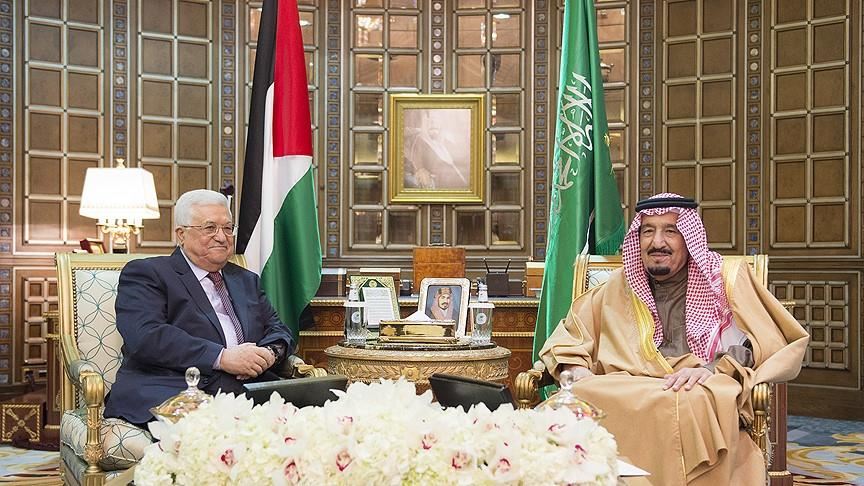Saudi-Palestine: Blood Brothers Again?
August 19, 2023 | Expert Insights

The Israeli-Palestinian conflict is one of the world's most intractable and persisting disputes and perhaps the most ignored too! It has been made even more complex by wars, armed rebellion, terrorism and spurts of peace efforts by outsiders.
It all began when the nascent state of Israel fought existential wars for its survival with its belligerent Arab neighbours, wars in which the Palestinians were not a participant but mere collaterals. Once the Arab armies had been comprehensively defeated on the field of battle and they withdrew to lick their wounds, the Palestinian movement began to take shape and form. From the heydays of the PLO with a dashing, pistol-toting Arafat as its poster boy feted at capitals from New Delhi to Moscow, the movement has sunk to a level where it generates little interest even when Al Jazeera beams graphic images of teenagers and reporters being shot in cold blood in the mean streets of Gaza or West Bank.
But Israel has always believed that real peace with Palestinians lies through its Arab states and not through the good offices of extra-regional powers like Russia or the U.S. In 2020 Tel Aviv made a breakthrough with President Trump's much-touted Abraham Accords in which the UAE and Bahrain were co-signatories along with Israel. But, the Saudis, and the Palestinians, were conspicuous by their absence.
For many years, behind the scenes, Tel Aviv and Riyadh have been in a conversation under the quiet but steady hands of Crown Prince Mohammed bin Salman Al Saud, colloquially known by his initials MBS or MbS. Is the recent announcement by Riyadh to send an official envoy to Palestine, which coincides with Saudi Arabian signalling that it is ready to progress in its relations with Israel, indicative of a new direction in Saudi foreign policy?
Background
Saudi Arabia has always been an outlier in the Arab-Israeli conflict.
To begin with, it has never been militarily strong enough to stand on its own feet. For this, the United States has always been by its side. This military assistance was given on the condition that it would be used to fight the common enemies of the U.S. and the Saudis, not Israel.
The small armed forces of the Saudi kingdom had only a token presence in the various Arab-Israeli wars. Israel and Saudi Arabia do not have any direct land border. This, in a sense, was another factor that cut off Riyadh from the common Arab cause against Zionism. Just once did the Saudis use their soft power against Israel. During the 1973 war, they carried out an oil boycott against all those countries supporting Israel.
The Saudi monarchs have never been comfortable with the different Palestinian groups fighting against Israel. At the start, these groups were mostly leftist in nature. They had strong links with the Soviet Union. Soviet Communism was anathema to Saudi Arabia. When Islamic movements sprung up in Palestine, Riyadh initially showed support for them. When they shifted their allegiance to Iran, the Saudis were disappointed. Then they decided to place all their bets on the internationally recognized government of the Palestinian Authority.

Analysis
The Palestine issue has been peripheral to Saudi foreign policy from 1948 onwards. This is despite the high degree of anti-Semitism within the kingdom. In the ultimate scheme of things, Israel was never a direct threat to Saudi security. The Saudi opposition to Israel has been mostly emotional due to its central role in the Islamic world as the guardian of Islam’s holiest place of worship.
In many cases, the enemies of Israel were also the enemies of Saudi Arabia. This was true of the ideology of Arab nationalism. As an anti-imperialist ideology, it had its origins in Syria and Egypt. By nature, it was a secular belief system. As a matter of principle, it was opposed to the monarchical system of governance.
Both these points were red flags for the Saudis. Saudi Arabia was and remains a conservative Islamic monarchy. It is a status quo power. If things can go on as they are without causing any serious damage, then Riyadh is happy to stay the course. The fact that the Arab nationalists were also fighting against Israel was of secondary concern. What matters most is regime stability. Even inter-Arab solidarity comes second to that.
As a result, true Arab unity could never be achieved against Israel despite the rhetoric of the Arab nationalists. The Saudi monarchy fought against the leading proponent of Arab nationalism, Gamal Abdel Nasser, equally hard as Israel. The enemy's enemy became their friend in a way. Openly this was never acknowledged.
The Saudi duplicity was again laid out clearly when Egypt began normalising its relations with Israel. The kingdom initially supported this process. Egypt, under President Sadat, was moving away from the Soviet orbit and coming under the American security umbrella. Cairo’s monarchical neighbour was obviously happy with this. Oil money from the conservative monarchy started pouring into the Egyptian Republic.
Then Sadat took things one step too far. He actually established full diplomatic relations with Israel. This was as yet unthinkable to the Saudis in the geo-political context of the time. So, they joined calls for boycotting Egypt from the Arab League. The regional situation was highly fragile at the time from the Saudi perspective. An Islamic Revolution had just taken place in neighbouring Shia Iran. Islamic anti-Zionism was high in the air. In such a situation, Saudi Arabia could not afford to look soft on Israel.
As the Cold War came to an end, the Saudi security calculus was changing. Iran and Iraq had emerged as two new threats. Arab nationalism had died down. The Palestinian Liberation Organization (PLO) made overtures to the Saudi regime under Yasser Arafat. This was temporarily put on hold when Arafat mistakenly supported Saddam Hussein’s invasion of Kuwait. Later, this temporary glitch was removed. The Palestinian Authority started receiving money from Saudi Arabia. When the Oslo Accords were signed between Israel and the PLO, Riyadh did not lodge any protest and tacitly even gave its conformity.
In the 1990s, the Israeli threat began to appear even less remote to the Saudis. Initially, Saddam Hussein was a common enemy of Riyadh and Tel Aviv. U.S. troops were stationed on Saudi soil to protect it against Iraq. This angered the Islamic fundamentalists within the kingdom. These same fundamentalists were building up close relationships with their Palestinian counterparts. They wanted the destruction of Israel. According to them, the Saudi regime was a lackey of the West and was thus indirectly supporting the Zionist state. The path to the liberation of Jerusalem lay through regime change in Riyadh for these ideologues. The Saudi policy of running with the hare and hunting with the hound was becoming increasingly difficult. To appease the fundamentalists, the kingdom's monarchy decided to fulfil some of their demands. This included the establishment of a more conservative social order. Saudi Arabia became a closed Islamic society.
Baathist Iraq slowly started to weaken under a bevvy of American sanctions. Then in 2003, the U.S. invaded Iraq. Saddam Hussein’s regime was toppled. At one stroke, a crucial buffer state between Iran and Saudi Arabia was removed. The Iranian threat was now at the doorstep of Saudi borders. Now the Saudis realized they must remove this Iranian threat by normalizing relations between Israel and the Arab states.
Riyadh had already taken steps in this regard. In 2002 it formulated the Arab Peace Plan at the Arab League Summit. This was put forward as a comprehensive peace plan. The terms and conditions were laid out clearly. Two states, Israel and Palestine, would exist side by side. The borders would be based on the conditions before the 1967 Arab-Israeli war when Israel illegally annexed Palestinian territory. Palestinian refugees would have the right to return to their homes captured by Israel. In return for all this, each Arab state would establish full and normal diplomatic relations with Israel.
Sadly, this peace plan turned out to be too idealistic. Neither the Israelis nor the Palestinians were able to accept it. The United States failed to persuade either side. This failed Saudi initiative reduced Riyadh’s influence among the Palestinians. Iran came to fill this void, especially through fundamentalist groups like Hamas and Islamic Jihad. Having learnt its lesson, Saudi Arabia has since then not put forward any other peace proposal.
In the meantime, the Iranian challenge was growing. Informal contacts between Riyadh and Tel Aviv were initiated. Israeli overflight rights over Saudi territory were granted in case they had to bomb Iranian nuclear weapons sites. Bahrain and UAE normalized relations with Israel with implicit Saudi backing.
Recently though, there has been sort of a détente between Saudi Arabia and Iran. At the same time, the U.S. is trying to bring Saudi Arabia and Israel together officially. The Saudis have realised that they cannot completely forget the Palestinians. The hard-line and uncompromising policies of the current Israeli government towards the Palestinians have given further reason for Riyadh to rethink its Israeli/Palestinian strategy. This is why the kingdom is now reaching out to the Palestinians by sending an official envoy. They are trying to play hardball as the U.S. continues to coax them into officially recognizing Israel.
Assessment
- The importance of Israel to Saudi Arabia has suddenly fallen one notch. Due to this, the Saudi regime is correcting its foreign policy course.
- Due to their Arab and Islamic values, the Saudis cannot totally cut off the Palestinians. Moreover, there is a strong ground swell for sympathy for the sufferings of the Palestinian people domestically, and the regime has to be conscious of this fact while making its Palestinian policy.
- Saudi Arabia wants some concessions from Israel on freezing Jewish settlements before they move ahead on the diplomatic front. The Israeli government is refusing to make any compromises in this area, hence the impasse in the Saudi-Israel rapprochement.








Comments